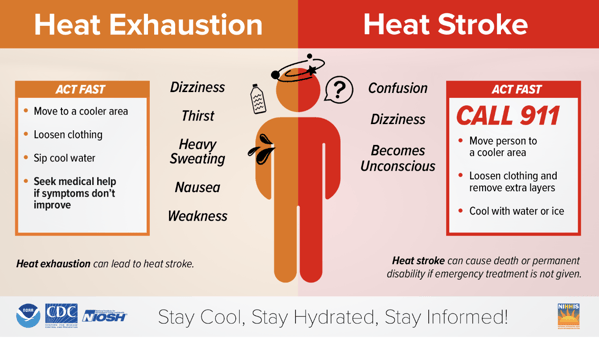As summer approaches, many schools prepare to welcome students for summer school, camps, and other enrichment programs. While these programs offer valuable and fun educational opportunities, it's essential to prioritize safety to ensure a positive and secure environment for all participants. Here are the top 10 safety considerations to keep in mind when planning your summer programming.
1. Health and Hygiene Protocols
- Maintain strict health and hygiene protocols during the summer, just as during the school year, as you would during the school year remains a critical component of planning.
- Ensure regular cleaning and sanitization of classrooms, restrooms, and common areas. Provide hand sanitizers and encourage frequent handwashing.
- Monitor students and staff for symptoms of illness and have a clear policy for handling health issues and illnesses, such as lice, strep, pink eye, etc.
- Ensure that you have properly qualified and trained healthcare staff on-site to manage the well-being of the community. If not using your school year healthcare staff, then facilitate communication and a smooth transition during the summer months. And determine how many and which of your summer program staff require CPR or First Aid certifications.
2. Heat Safety
- Make sure classrooms and other indoor spaces are adequately ventilated and air-conditioned.
- Encourage students to stay hydrated by providing water stations and allowing frequent water breaks.
- Schedule outdoor activities during cooler parts of the day and ensure there is ample shade.
- Communicate policies for code orange and red heat days and modify schedules and activities as necessary during excessive heat.

3. Emergency Preparedness
- Be prepared for various emergencies, including natural disasters, medical emergencies, and security threats.
- Develop and practice emergency plans and communication channels with staff and students.
- Equip classrooms with first aid kits and ensure all staff are trained in basic first aid and CPR.
- Clearly communicate emergency procedures to students and parents. It is important to modify your incident response team and protocols as needed during the summer, particularly if key people are taking vacation time.
4. Secure Facilities
- Control access to school premises to prevent unauthorized entry.
- Implement sign-in/sign-out procedures for students, staff, and visitors. Use ID badges for easy identification and maintain a secure perimeter with fencing and locked gates.
- Consider employing security personnel if necessary.
- Control access to specific facilities on campus as needed such as swimming pools, waterfronts, challenge courses, power tools, etc.
5. Supervision and Staff Ratios
- Maintain appropriate staff-to-student ratios to ensure all students are properly monitored.
- Train staff to be vigilant and to intervene promptly if they notice any unsafe behavior or situations.
- Identify high-risk activities and make sure that specialized and trained staff are supervising those activities (swimming, archery, challenge course, etc).
- Consider having staff in uniforms with badges to allow for easy identification.
6. Transportation Safety
- If your summer program includes transportation, ensure all vehicles are in good condition and meet safety standards.
- Hire qualified drivers and conduct background checks.
- Implement clear procedures for boarding and exiting buses, and ensure students are supervised during transit.
- Conduct regular maintenance and safety inspections of vehicles and document it. If using faculty or staff as drivers, ensure that they have had the proper training for the type of vehicle.
7. Field Trip Precautions
- Conduct thorough risk assessments for all trip locations.
- Obtain parental consent and provide detailed itineraries.
- Develop explicit supervision policies and ensure all students are accounted for at all times and have a plan in place for emergencies.
- During staff training and orientation, provide simulations and role-play various field trip emergency situations.
8. Bullying and Harassment Prevention
- Implement clear policies and procedures for reporting and handling bullying incidents.
- Provide training for staff on recognizing and responding to bullying.
- Foster a culture of respect and kindness among students.
9. Food Safety
- Ensure meals and snacks are prepared and stored safely to prevent foodborne illnesses.
- Review protocols for how allergy information is provided to summer staff.
- Review policies regarding sharing food between participants and/or activities that will involve food.
- Cater to dietary restrictions and allergies by clearly labeling foods and avoiding cross-contamination.
- Educate staff on how to respond to allergic reactions and other food-related emergencies (i.e. review locations for Epi-pens).
10. Mental Health Support
- Provide mental health support by having counselors available for students to talk to.
- Create a supportive environment where students feel comfortable expressing their concerns.
- Encourage activities that promote mental well-being, such as mindfulness exercises and physical activities.
By addressing these top 10 safety considerations, you can create a secure and supportive environment for your summer school program. Prioritizing safety not only protects students and staff but also ensures that the educational experience is enriching and enjoyable for everyone involved. Remember, a safe summer school program is a successful one!
On Joffe Academy, our End-of-the-Year Activities Toolkit prepares your school for a safe and successful end of the year! This comprehensive package includes a course on how to run tabletop exercises, expert interviews on summer activities, and an end-of-year documentation course, plus more valuable resources.
This blog post was co-authored with Nat Saltonstall, Executive Director, and Karen McCann McClelland, Senior Advisor, of SPARC (Summer Programs and Auxiliary Revenue Collaborative). For more on navigating summer program safety, please contact SPARC.

